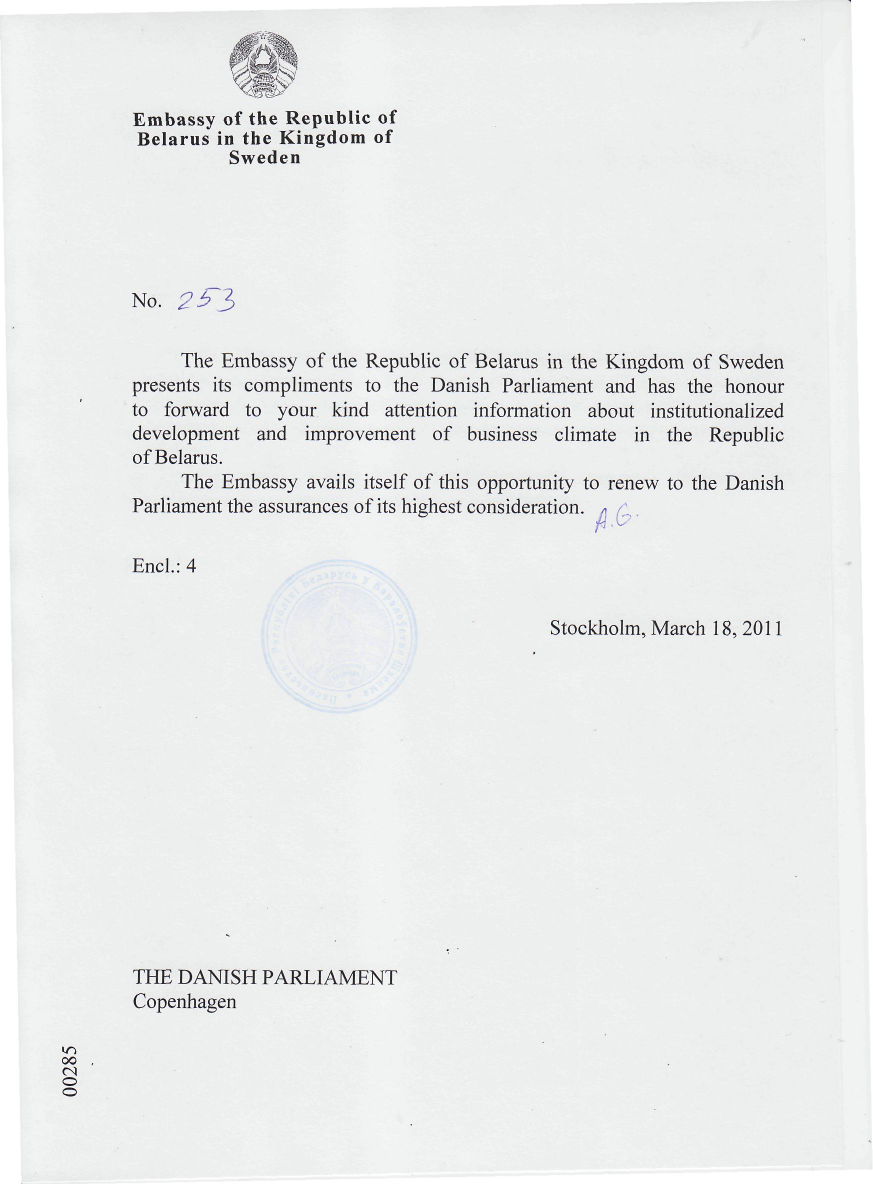Udenrigsudvalget 2010-11 (1. samling)
URU Alm.del Bilag 123
Offentligt





Institutionalized Development and Improvement of Business Climate in theRepublic of BelarusA) Political and Institutionalized DevelopmentThe Government of the Republic of Belarus is carrying out step-by-stepactivities to improve conditions for business, to create favourable investmentclimate, to eliminate excessive interference of the authorities into the activitiesof companies and to eliminate ungrounded administrative barriers.Since 2010, the so-called “turnover” taxes have been practically abolished.Almost all the taxation methods and models have been adjusted to internationalstandards.With coming into force of the Taxation Code of the Republic of Belarus on the1stof January 2011 the system of taxation has been modified according tointernational set of taxes and levies, thus avoiding the limitations of economicinterests of companies. The new taxation system includes the VAT, income tax,property and ecology taxes, social security tax. Other taxes and levies such asexcise duties, customs duties, state duties, license taxes, etc. will be collectedonly if the object of taxation arises.275 administrative procedures or 35 percent imposed by 19 governmental andstate agencies have been abolished in 2009 alone. 349 administrativeprocedures by 26 governmental authorities have been harmonized andsimplified.637 administrative procedures are totaling the list of the Council of Ministers asof the 30thof January 2010.40 percent of goods have been removed from the customs lists of goods formandatory certification in the Republic of Belarus in 2009. These lists nowinclude only the most essential goods for public and industrial use.220 standards have been approved in 2010, 91 of them (or 41 percent) havebeen harmonized according to international and European standards.Decree of the President of the Republic of Belarus No 450 of 1 September 2010On Licensing of Business Activitieshas abolished 16 types of activities. Thataccounts for 32 percent reduction or 160 thousand licenses.
2Transparent and facilitated control system has been introduced. This systemincludes a two-year moratorium on inspection of the newly founded legalentities.The new procedure of crediting for the small and medium enterprises (SMEs)has been established. The new procedure is a part of the governmental programto support SMEs. The new procedure covers various areas of financial crediting(both repayable and non-repayable), leasing, new instruments of support, suchas low-interest crediting and financial guarantees on credits provided by banksto SMEs.A new period of privatization and reforms has started in Belarus. More than 300new companies have been established in 2008-2010 as part of the privatizationprogram. More than 20 deals with state-owned shares have been concluded.The biggest packets of shares of such enterprises as Beltransgas, Motovelo,Velcom, Best as well as Belvneshekonombank and BPS-Bank have been put forsale.The new privatization plan for 2011-2013 is being formed. The plan providesfor the completion of reforms of state enterprises and expending theprivatization network for foreign investors.Of strategic importance for the development of economic sphere in Belarus isthe new Presidential Directive No 4On the Development of EntrepreneurshipInitiative and Stimulation of Business Activities,which was introduced by thePresident of the Republic of Belarus of the 31 of December 2010. Its majorprovisions are aimed at further improvement of entrepreneurs’ activities as oneof the key factors of dynamically developing society and economics of theRepublic of Belarus. The Directive will also provide for the ban on interferenceof the authorities in the pricing process of business entities; will provideextended protection of private property; further elimination of administrativeprocedures; reduction of tax duties, revision of existing system of penalties inthe sphere of business activities with the view of apportionment of liabilitydepending on the nature of the offense and the extent of the harm; favour theexclusion of excessive control of labor-market.The main principle of the Directive can be formulated as “competition - wherepossible, government regulation - where necessary”.The realization of the Directive would create a more competitive and stableenvironment for economic activities, reduce time and financial costs for
3business administration, and as a result - increase investment opportunities andimprove business climate.The Council of Ministers together with the National Bank of Belarus, regionalexecutive committees and Minsk City Executive Committee are to fulfill theImplementation Plan of the Directive. Thus, the Prime Minister of the Republicof Belarus, the Governor of the National Bank, the Chairpersons of the regionalexecutive committees and Minsk City Executive Committee are directlyresponsible for the implementation of the Directive.The draft law of the Republic of BelarusOn Public-Private Partnershipisbeing developed. This draft law will consolidate the position of the state toprioritize the development of mutually beneficial relations with the privatesector and to integrate all the key provisions regarding the realization of thispartnership (goals, objectives, principles, directions, forms of cooperation, theempowerments of state bodies and methods of realization, potential benefitsand preferences, guarantees, risks, responsibilities of the parties, the settlementof disputes).B) Arrangements for improvement of the business climate
The efforts of Belarus in the sphere of economic liberalization andimprovement of the business conditions are making Belarusian economy muchmore attractive for investments. According to theDoing Business 2011, Reportby International Financial Corporation and World Bank,starting with 2008Belarus has improved its position from the 115 place to the 58 (up 57 positions)among 183 countries mentioned in the research for its sustained reforms ofbusiness activities simplification.Moreover, Belarus has joined the world’s first top five countries-reformersleading both in the number of implemented reforms in the sphere of businessliberalization and their efficiency.The World Bank/IMF Report pertaining to the regulation of foreign directinvestments acknowledges that Belarus has become a regional leader in termsof reduction of procedures for foreign enterprise establishment and that Belarushas surpassed such countries as Austria, Britain, Spain, Ireland, Poland,Romania, Slovakia, the Czech Republic, France, the United States and Japan.Belarus has improved its stand in terms of the effective access of enterprises tothe land resources. On the basis of the various indicators in this area, Belarus isat the same level as countries of European Union, the USA and Canada.
4The World Bank states that in terms of investment opportunities in varioussectors of the economy Belarus meets the requirements of many EuropeanUnion countries.UN Economic Commission for Europe in its surveyUNECE Countries inFigures 2009presents data which demonstrate the leadership of Belarus inseveral important indicators of social and economic development.In particular, the gender gap in wages in Belarus is lower than that in mostUNECE member states and is the same as in Germany, the USA andSwitzerland.Belarus has a very low unemployment rate – 1 percent, while in some of the EUcountries, this rate rises to 7-8 percent, including Poland – 9.6 percent, Turkey– 8.5 percent, Germany – 8.4 percent , Spain, - 8.3 percent, France- 8.3 percentBelgium – 7.5 percent.According to the GDP per capita, Belarus is ahead of several Eastern Europeancountries (Albania, Serbia, and Montenegro) and most of the CIS countries, aswell as may be compared to two EU countries - Bulgaria and Romania.





